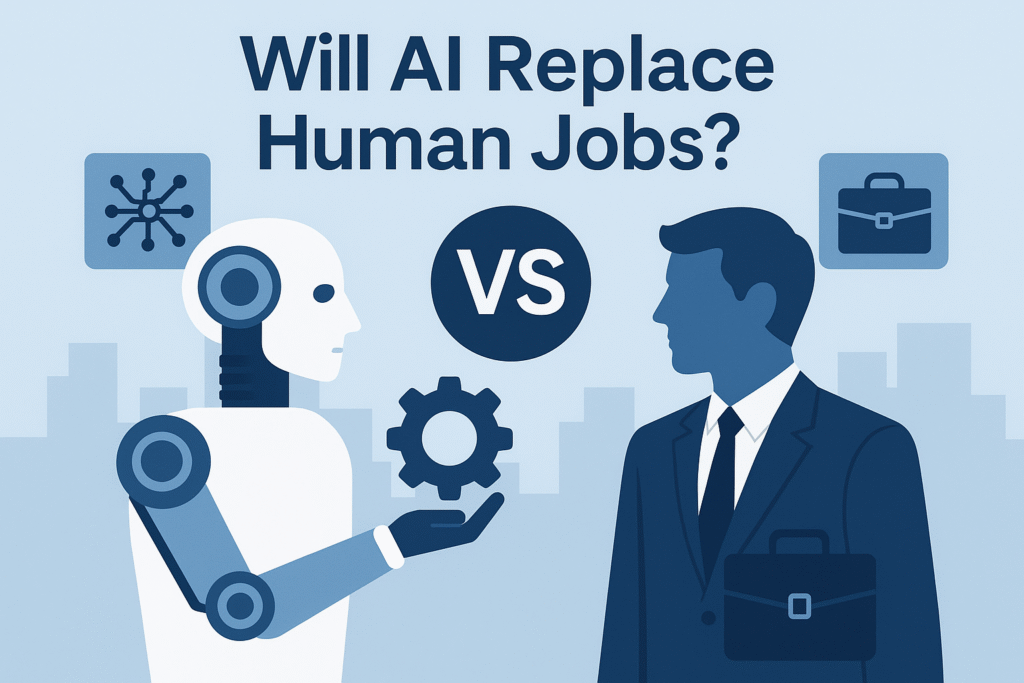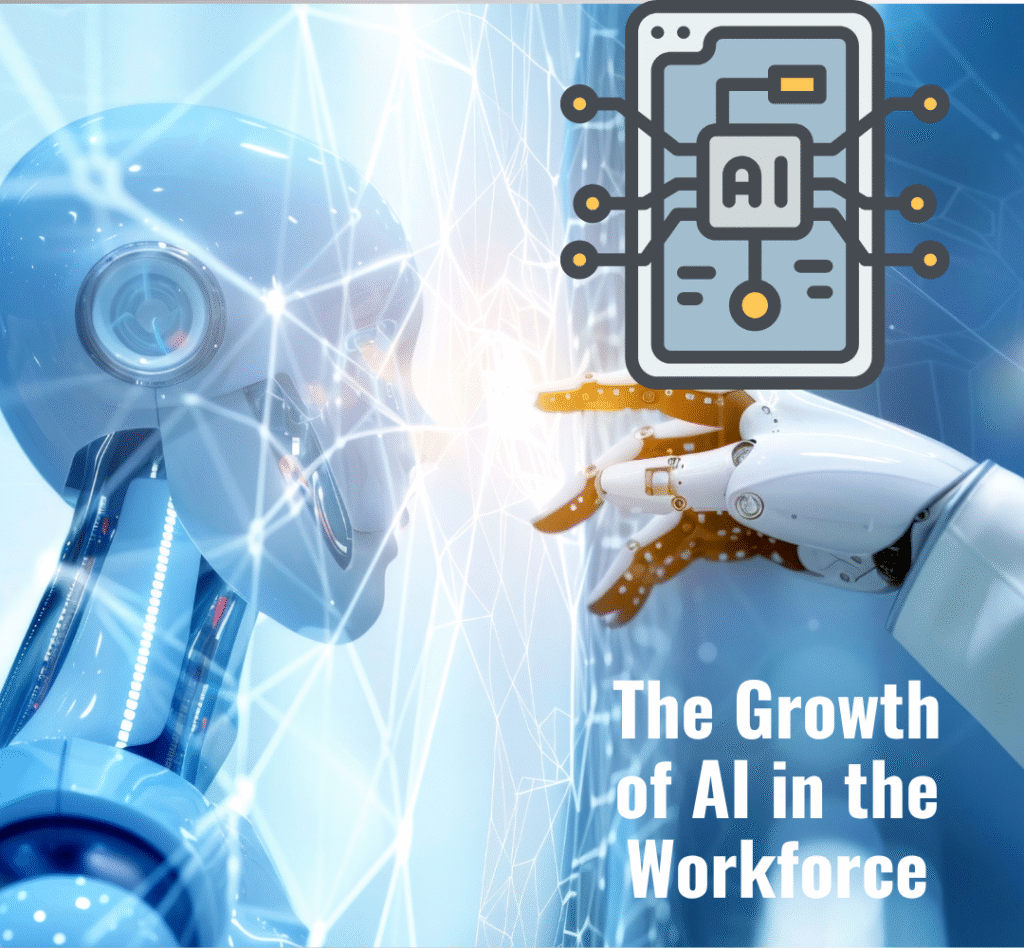
Introduction
Artificial Intelligence is no longer just a futuristic idea.it’s already part of our everyday lives, from voice assistants like Siri to advanced systems in healthcare and finance.
While AI offers many benefits, it also raises concerns about job security. Some worry it could replace human roles, while others see it as a way to eliminate repetitive tasks and create space for more creative work.
The reality is that AI acts as both a tool and a disruptor. It can open up new opportunities while also making certain jobs obsolete. This blog will explore the pros and cons of AI in the workplace, examining which jobs are most at risk, which are likely to remain secure, and how we can adapt to these changes. The goal isn’t to pit humans against machines but to find a balance where both can work together and thrive.
Understanding the concept of AI
At its core, Artificial Intelligence is the simulation of human intelligence by machines. This means that computers and systems are programmed to think, learn, and make decisions much like a human brain would. AI involves various technologies such as machine learning, natural language processing, computer vision, and robotics.
Understanding the concept of AI
Artificial Intelligence is essentially machines mimicking human intelligence. It enables computers to think, learn, and make decisions using technologies like machine learning, natural language processing, and computer vision.
Machine learning, a key part of AI, lets systems improve automatically by analyzing data. For example, Netflix suggests shows based on your preferences, and email filters block spam both powered by AI.
Beyond that, AI helps computers understand speech, interpret languages, recognize patterns in images, and predict outcomes. The ultimate goal is to build systems that can work smartly and independently.
Brief history and evolution of AI
- AI has been around since the 1950s when scientists first tried to create machines that could think like humans Early systems were simple just following set rules But as computers got faster and more data became available AI started improving quickly.
- By the 1990s and 2000s AI was making big moves like when IBMs Deep Blue beat the world chess champion Then in the 2010s AI got even better topping humans at complex games like Go and helping with things like self-driving cars voice assistants and medical tests
- Today AI is more advanced than ever using deep learning to process huge amounts of data spot patterns and make smart decisions This fast growth has people both excited and worried especially about how it might change job
Industries already using AI

- These days AI is popping up in all kinds of workplaces, not just Silicon Valley tech labs. Doctors are using it to help diagnose patients faster and suggest treatment options, while banks tap into AI to sniff out shady transactions and decide who gets approved for loans. Over in retail, those helpful chatbots answering your questions? That’s AI at work, along with those scarily accurate product recommendations you keep getting.
- Factories have totally transformed thanks to AI too. Smart systems now handle entire production lines, spot defective items with eagle-eyed precision, and even predict when machines are about to fail – saving companies a fortune in downtime. Shipping companies are all over this tech too, using it to map out the quickest delivery routes and keep their warehouses perfectly stocked.
- Even schools and law firms are jumping on board. Teachers are getting help from AI tools that customize lessons for each student and grade assignments in a flash. Meanwhile, lawyers are using it to plow through mountains of legal documents in record time. It’s wild how this technology has wormed its way into so many different jobs – some folks are excited about the possibilities, while others are watching nervously to see how it’ll change their workplaces.
Emerging AI technologies in business
- Companies are racing to use the latest AI tools to keep up with the competition. They’re analyzing customer comments and churning out content automatically thanks to language processing tech. Computer vision is changing the game for spotting product defects and verifying identities, while predictive tools help businesses anticipate what customers will want next.
- The real game-changer has been AI that can generate its own images, articles, and even chunks of computer code. This is creating fresh opportunities in advertising, product design, and tech development. Smart assistants and AI-powered platforms are quickly becoming must-haves for running a business smoothly.
- As these technologies keep improving, more companies will jump on board, which is bound to shake up how jobs are structured. The big debate isn’t about whether we’ll use AI – that ship has sailed – but rather how deeply it will transform the way we all work.
How AI is Changing the Nature of Work
Automation and repetitive tasks
- AI is already shaking up the workplace by taking over those boring, repetitive jobs nobody really enjoys. You know the ones – typing up data, scheduling back-to-back meetings, wrestling with overflowing inboxes, or chasing down invoices. The stuff that eats up your day but doesn’t really use your brain. AI can knock out these tasks quicker than any human, without ever getting tired or making typos.
- This actually frees people up to do more interesting work. Instead of wasting afternoons formatting spreadsheets, employees can actually dig into what the numbers mean and make smarter calls. Most folks find this kind of work more satisfying anyway, and companies get better results when people focus on thinking rather than mindless tasks.
- Of course, there’s another side to this. Jobs built entirely around these routine tasks – like certain admin roles or bookkeeping positions – might start drying up. They won’t vanish completely, but they’ll definitely change. Workers in these fields will need to pick up new skills to stay relevant as AI handles more of the grunt work. It’s less about robots stealing jobs and more about jobs evolving to work alongside smart tech.
- AI is proving to be a game-changer when it comes to making smarter business decisions. These days companies are drowning in data but often can’t make sense of it all fast enough. That’s where AI steps in – it can chew through mountains of information in no time and spot patterns and opportunities that would slip right past most of us.
- Take marketing teams for instance. AI tools can track how customers behave and recommend hyper-targeted campaigns that actually work. Over in finance departments, these systems forecast market swings and help craft investment moves before opportunities pass. Even HR is getting in on the action, using AI to read the room on employee morale and suggest real fixes to boost company culture.
- While these AI-powered insights help leaders make quicker, better-informed calls, there are some real concerns bubbling up too. Questions about keeping data private, whether the algorithms play fair, and if we’re leaning too hard on machine suggestions without applying our own common sense. At the end of the day, AI might be great at crunching numbers, but we still need human wisdom and moral compasses to make the right judgment calls.
Customer service and call center jobs
- ustomer service is getting a serious upgrade thanks to AI helpers and chatbots. These digital assistants can tackle tons of customer questions at once, giving quick answers anytime across different websites and apps. They’re great at handling common questions, checking order statuses, and solving simple problems without needing a real person to step in. This means companies don’t need as many support staff, and customers get help faster.
- But let’s be real – there are still plenty of times when you just need to talk to an actual human. Tricky problems, emotional situations, or when you need that personal touch still require real people. The smart approach going forward is a tag-team setup where AI takes care of the basic stuff, freeing up human agents to handle the more complicated or sensitive cases that need genuine understanding and care.
FAQs
1. Will AI completely eliminate all jobs?
No AI is unlikely to eliminate all jobs While it will automate certain tasks and roles especially repetitive or data-driven ones it will also create new job opportunities that require human creativity critical thinking and emotional intelligence The job market will shift rather than disappear
2. What industries will be most affected by AI?
Industries like manufacturing, transportation, customer service, retail, and administrative services are most susceptible to AI-driven automation. Jobs that involve routine, repetitive tasks are at the highest risk of being replaced or significantly transformed.
3. Can AI create new job opportunities?
Yes, AI is expected to create numerous new roles in areas such as machine learning development, AI ethics, data science, cybersecurity, and more. Additionally, roles involving human traits like creativity, empathy, and strategic thinking will grow in demand.
4. How can workers prepare for the AI revolution?
Workers should focus on developing soft skills and digital literacy. Upskilling through courses in data analysis, programming, critical thinking, and emotional intelligence can be valuable. Staying adaptable and embracing lifelong learning is key to thriving in an AI-driven world. “summarise this text and dont use any hyphens:
5. Is AI a threat or an opportunity for the workforce?
AI is both a threat and an opportunity. It threatens certain job roles but also opens up exciting possibilities for innovation, efficiency, and new careers. The outcome depends on how society, businesses, and individuals choose to adapt and manage the transition.
